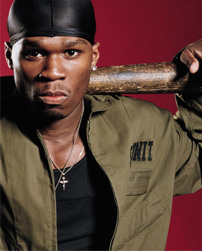( AP ) - 50 Cent has more than 1 million friends on MySpace, but if the rapper ever decides to leave the social network, he'll be leaving behind those friends, too. So like a growing number of artists, he's started his own social networking site.
On Thisis50.com, fans can create profiles and friend lists just like on MySpace, but 50 Cent has direct access to the site's users and their e-mail addresses.
More and more acts, from Kylie Minogue to Ludacris to the Pussycat Dolls, are launching their own social networks, which are becoming a sort of next-generation version of artist Web sites.
The social networking component gives fans a reason to hang out on a site and visit more often than they would a standard Web site. And artists can sell advertisements on their sites and offer downloads and merchandise for sale -- options they don't have on MySpace or Facebook. Plus, they own the content and data on how fans use their site, which they don't get on other social networks.
"The thing that separates Thisis50 from MySpace is we control the e-mail database," says Chris "Broadway" Romero, director for new media at G-Unit Records, which handles Thisis50. "We can e-mail members if we want to."
Thisis50 isn't meant to be a fan club, but rather a platform for 50 Cent to showcase his music and music he likes, and comment on news and user profile pages. Ludacris' WeMix.com, on the other hand, is more of a hub for aspiring artists to upload their music.
The artist networks aren't meant to replace MySpace or Facebook, which tend to attract a broader audience and more users.
"(Artists) think about MySpace and Facebook as funnels for their own social networks," says Gina Bianchini, CEO of Ning, a company that provides social networking tools for Thisis50, Sara Bareilles and others. "They take and use services where they don't know the users, don't have access and don't have full control, and funnel those fans to something they do control."
The key to getting users coming back to the sites is artist involvement, either through blogs or comments on user pages or exclusive footage and other content.
"The biggest thing we push to artists is, 'Embrace the site,"' says Evan Rifkin, CEO of Flux.com, a social networking platform partly owned by MTV.
It's relatively inexpensive to create a social network if artists use one of the growing number of companies that provide the tools and hosting. For instance, Ning charges $34 per month for a site and hosting. And Flux works with artists and labels on a revenue-sharing basis. Artists can set up their main site for free and pay a percentage of revenue from advertisements and sales on additional pages.
Artists also tend to pay for labor to run the sites. But if fans get involved and add things to the site to share with others, it can reduce the need for staff to constantly provide new content, Romero says.
In addition, many artists are simply turning their main Web site into a social network. Suretone Records director of new media Ashley Jex says the label is working with Flux to incorporate social networks into all its artists' sites to cater to the hardcore fans and keep them clicking around.
With Flux, which also has deals with Universal Music Group and Virgin, users create one profile and with one click they can join the network of any artist using it, rather than having to create new profiles for each.
Ice Cube and DJ Pooh added a twist earlier in March, launching UVNTV, a broadband TV and social networking site where artists and brands can create their own channel and subscribers can create profiles and chat with one another. Artists get detailed information on their users and can sell advertisements, merchandise, downloads or even subscriptions to their channel. They also own and control the content.
"You know the demographic of anybody watching your content," DJ Pooh says. "You know what they watched and clicked on." The service is in beta and free to artists and is expected to formally launch in January 2009. So far, Snoop Dogg has a channel there, as does Ice Cube and such brands as RockStar Games and Source.
Even more important: Fans seem to be buying directly from the sites. On Minogue's KylieKonnect, launched in fall 2007 through U.K.-based New Visions Mobile, nearly 25 percent of users have made a ringtone, download or merchandise purchase, company director Julia McNally says.






